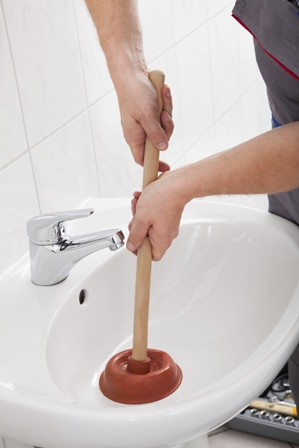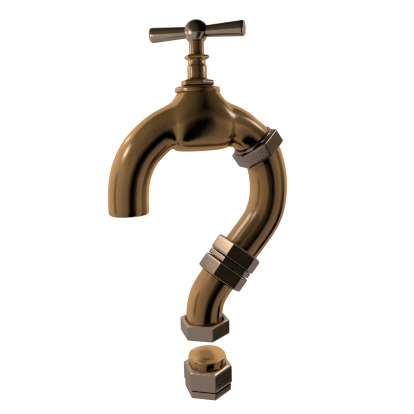 You may want to grab a calculator. But you'll probably get the idea even without it.
You may want to grab a calculator. But you'll probably get the idea even without it.
If you brushed your teeth this morning, you probably used 2 gallons of water. Afterward, if you took a shower, you used as much as 5 gallons per minute (though nobody was timing you). Still, that's better than filling a bathtub, which requires about 36 gallons of water.
If you washed the dinner dishes by hand, you probably used between 8 and 27 gallons of water. This may sound like a lot because it is – and it's also why energy advocates recommend using the dishwasher instead. It uses only between 6 and 16 gallons.
You may be tempted to overlook all those water glasses or plastic bottles you refilled today. (Water is good for you, after all.) But not so fast. Every time you flushed the toilet, about 3 gallons of water went down the drain.
Your “tab” equals 100 gallons per day
Round the numbers up or round them down, but it all adds up to between 80 and 100 gallons of water – the average amount of water the U.S. Department of Energy estimates that every American uses every day. If you round up to 100, it makes it easy to figure out how much water your household consumes.
Considering the workout your plumbing gets every day, it's no wonder you want to do what you can to prolong the life of your home plumbing system. And don't worry: you can still turn on the faucets. You can still turn up the pressure in the shower. And you can flush to your heart's content.
The Experts in Your Home Chico plumbing team can vouch for these 25 plumbing tips. They will help your plumbing system last longer – and save you money on your water bill, too.
First, get proactive
Become a student of plumbing
 You don't have to pass a licensing exam, but reading online articles from the Experts can prepare you to make minor plumbing repairs. So can signing up for plumbing classes at your local home improvement store. Be sure to assemble a tool kit, too, as you begin to navigate your plumbing learning curve.
You don't have to pass a licensing exam, but reading online articles from the Experts can prepare you to make minor plumbing repairs. So can signing up for plumbing classes at your local home improvement store. Be sure to assemble a tool kit, too, as you begin to navigate your plumbing learning curve.
Know thy shut-off
If you haven't already, locate your home's main water valve and learn how to use it. It could be the only way, say, to stop a pipe burst from flooding your home with water. Store any tools you need for a quick shut-off nearby.
Know thy shut-offs, part 2
While you're at it, learn how to shut off water to your home's toilets, sinks, washing machine and other water-reliant appliances. When they act up – because they will in time – a disconnect could spare you pipe damage and save you hours and hours of cleanup time.
Keep your eyes open for corrosion
Hunting down valves is an ideal time to inspect pipes for corrosion and shut-off valves for yellow, orange or green stains. If you spot them, call the Experts to replace the component immediately.
Maintain your (water) pressure
With a water pressure gauge, ensure that your home's water pressure hits a range of between 40 and 85 psi. Anything higher will place undue stress on your entire plumbing system. In this case, a pressure regulator installed by the Experts can bring it down to a safer level.
Develop water-wise habits

Avoid toilet clogs
It may be irresistible when you're rushing, but putting anything besides toilet paper down a toilet usually results in clogs – and overflows and damage, too. Baby and hand wipes also should go in the trash. Always.
Prevent sink and shower drain clogs
Install screens over sink and shower drains to prevent hair, food and soap particles from clogging the pipes in your bathrooms and kitchen. Plus, the screens make cleanup a snap.
Sidestep clog-removal products
The commercials can be compelling, but what they don't tell you is how some of the intense formulas can damage home plumbing. Better to take regular safeguards than resort to some truly explosive products.
Space your showers
Waiting at least 10 minutes between showers helps equalize water pressure. And if someone at home balks? Tell him or her to put the time to good use by running the exhaust fan to absorb moisture in the room.
Embrace regular indoor maintenance
 Repair drips and leaks without delay
Repair drips and leaks without delay
Drips and leaks do more than waste water; they can damage fixtures and cause damage to walls, floors and furniture. If you can't stop a drip or fix a leak yourself, call the Experts. Plumbing is one of our proudest specialties.
Tend to a running toilet
With all the activity a single toilet sees in one month, it's amazing that the interior parts hold up as long as they do. Still, they don't last forever, and a toilet that runs is a cue to make a different type of run – to the hardware store for some new plumbing parts.
Caulk with purpose
No one is a caulk expert right out of the gate. But with practice, you'll soon learn how to seal your toilets, sinks and showers like a pro. Replacing loose or damaged caulk is important before you get started.
Clear slow drains
Clogged sinks, tubs and showers drain slower and slower over time. They're also easy to ignore, but force yourself to clear them before you find yourself standing in ankle-deep water. You'll put less pressure on your pipes, too.
Clean faucet aerators
Here's a fooler: weak water pressure – or what appears to be weak water pressure. Many times, it's calcium that has built up inside a faucet aerator. Simply remove the aerators and clean them with vinegar to get water flowing freely again.
>>Need Help? Contact a Chico Plumber Today!<<
Check your washing machine hoses
Bulges, leaks and cracks in washing machine hoses can erupt (literally) into some of the most expensive claims insurance companies receive. The hoses should be replaced at least once every three years. And the machine should be set at least 4 inches from the wall to prevent hose damage.
Prevent freezing pipes
While we don't have to worry excessively about frozen pipes in northern California, we also can't afford to get complacent about adding insulation to pipes in the garage, crawl space, basement and other rooms exposed to cold weather.
Get a grip on your garbage disposal
The garbage disposal gets the Experts' vote for the most misunderstood home appliance. People either treat it gingerly – afraid to slide even some mushy corn flakes and milk down the drain – or overestimate its potency and fold remnants of an entire dinner down there. In fact, neither tack is correct – no matter how much horsepower a disposal may have. Bones, shells from shellfish and eggshells should never go down a disposal. Neither should fibrous foods such as bananas, broccoli, celery and potato peels – all of which can bring the blades to a dead stop. And coffee grounds and starchy foods, especially pasta? They should always hit the trash instead.

Once you know the prohibitions, prolonging the life of your garbage disposal is relatively simple:
- Turn on the power switch before putting anything down the disposal, just in case it malfunctions.
- Put several ice cubes down the disposal at least once a month to keep the blades sharp.
- Purchase a disposal brush to get at those hard-to-reach deposits that can build up on the blades and trigger odors.
Get in touch with your water heater
If the garbage disposal is misunderstood, then the water heater is usually forgotten – until it stops doing its job. It's usually during a visual inspection that homeowners notice a leak or corrosion on the tank – two signs that often signal that the water heater is quickly approaching the end of its useful life. This is when you should call the Experts without delay – and before the tank potentially blows. Alternatively, it may just need to be cleaned or flushed. Or it may benefit from a new anode rod, which protects the lining from cracking. In the meantime, you can maximize the lifespan of your water heater by:
- Setting the thermostat at an efficient 120 degrees.
- Covering it with an insulated, made-to-fit topper.
- Insulating the pipes that extend from the water heater. Pipe wraps or even old towels or rags can do the job nicely.
Maintain your exterior plumbing, too
 You'll have plenty to keep track of indoors, but remember that your home's plumbing extends to the exterior, too. Regular outdoor maintenance should be part of your regimen, especially:
You'll have plenty to keep track of indoors, but remember that your home's plumbing extends to the exterior, too. Regular outdoor maintenance should be part of your regimen, especially:
- Scheduling regular sewer drain maintenance, especially if you live on a heavily wooded lot where tree rots can cause huge blockages. “Snaking” is a smart preventive measure that will avert a full stoppage and damage to your pipes.
- Scheduling biannual checks of your septic system, if you have one.
- Disconnecting your outdoor hoses in the fall and turning off the water to avoid a pipe burst.
As these 25 tips guide you to better maintain your home plumbing system, remember the “cardinal rule” of home maintenance: if you notice something “funny” or unusual, call the plumbers at Experts in Your Home to investigate. Chances are, your gut instinct is correct. And nothing should stand in the way of prolonging the life of your plumbing system – and saving you money on your water bill, too.
If your plumbing seems fine but you want an inspection to make sure you're not missing anything, check out our 27 point plumbing inspection process.








